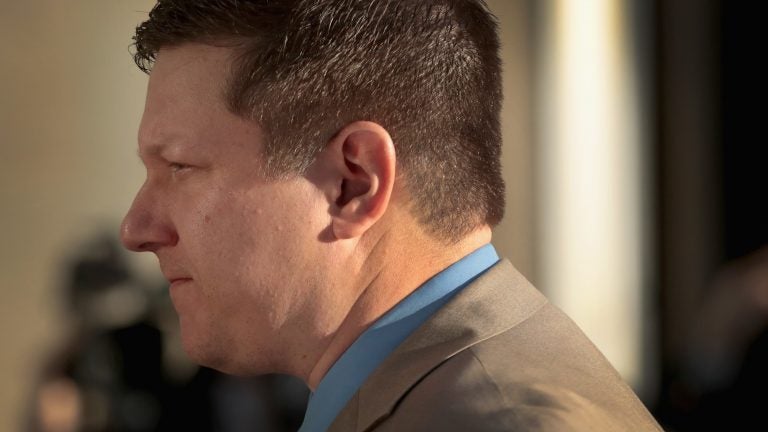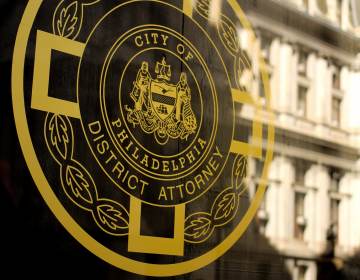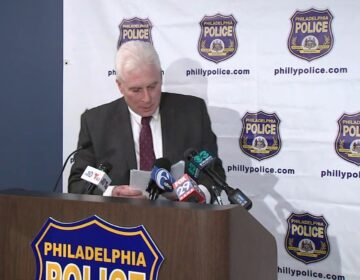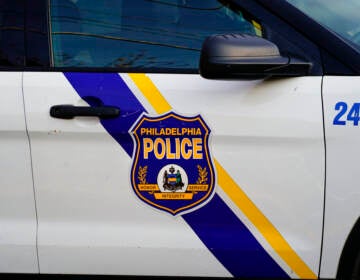Chicago police officer found guilty of 2nd-degree murder of Laquan McDonald

Officer Jason Van Dyke, seen outside a Chicago court last month, shot teenager Laquan McDonald 16 times in 2014. (Scott Olson/Getty Images)
White Chicago police officer Jason Van Dyke has been found guilty of second-degree murder and 16 counts of aggravated battery with a firearm in the shooting death of black teenager Laquan McDonald.
It took the jury of eight women and four men about eight hours to reach a verdict.
Van Dyke shot 17-year-old McDonald 16 times on Oct. 20, 2014. The teen’s death went largely unnoticed until a judge ordered in November 2015 that city officials release police dashcam video of the shooting. The video appeared to show McDonald, who was carrying a knife with a 3-inch blade, walking away from Van Dyke as the officer opened fire. The fallout has lasted years: The city’s top officer was fired, the local state’s attorney was voted out and an investigation by the U.S. Department of Justice found that Chicago Police officers were poorly trained. Van Dyke was suspended.
Then, days before the start of the trial, Mayor Rahm Emanuel abruptly announced he would not seek a third term — but he didn’t mention Van Dyke or McDonald as a reason for his decision.
After nearly three years of pretrial hearings, lawyers spent less than three weeks presenting their cases to the jury.
This week, Van Dyke took the stand and insisted that the infamous dashcam video didn’t show the shooting from his perspective. According to Van Dyke, McDonald was walking toward him with a knife and the shooting was self-defense. Van Dyke’s lawyer, Daniel Herbert, attacked “overzealous prosecutors” for the “unprecedented” charges. He described McDonald as an out-of-control teen with a history of violent outbursts and compared him to a character in a monster movie.
“When a monster turns and looks at the victim, that’s when the music starts to play,” Herbert said during his closing arguments.
But prosecutors argued that not a single shot was necessary. They showed the jury the dashcam video dozens of times and repeatedly noted that no other officer at the scene felt threatened enough to open fire on McDonald.
“It’s Jason Van Dyke firing bullets, ripping into the flesh of Laquan McDonald 16 times. That’s not justified, that’s not necessary — that’s first-degree murder,” prosecutor Joseph McMahon said right before jurors were given deliberation instructions.
The prosecution’s case
Prosecutors called on 24 witnesses, including police officers, doctors, nurses, paramedics, and experts in ballistics and video analysis.
Dr. Ponni Arunkumar, the chief medical examiner in Cook County, testified that McDonald was alive for each shot. She also noted that the teen had traces of the illegal drug PCP in his system at the time of his death.
Officer Joseph McElligott, one of the first officers to encounter McDonald that night, said on the witness stand that he didn’t shoot because the teen wasn’t a deadly threat and an officer with a Taser was on the way. Officer Dora Fontaine, who arrived around the time Van Dyke opened fire, testified that McDonald never moved aggressively toward the police.
However, former officer Joseph Walsh told the jury that McDonald “swung” a knife moments before the shooting. Walsh — who was Van Dyke’s partner the night of the shooting — faces conspiracy charges for allegedly exaggerating the threat McDonald posed to Van Dyke. He maintained that the dashcam video isn’t a fair depiction of what Van Dyke saw because it was recorded from behind McDonald. But Urey Patrick, a former FBI agent, testified that the “risk posed by Mr. McDonald did not rise to the necessity of using deadly force to stop it.” Patrick concluded that McDonald was not a threat because the dashcam video showed him moving away from Van Dyke.
Defending Van Dyke
Van Dyke’s lawyers essentially put McDonald on trial by calling numerous witnesses to testify about the teen’s history of violent outbursts, erratic behavior and drug use. But their biggest witness was Van Dyke himself.
The officer spent more than an hour on the stand answering questions during his teary — and sometimes defensive — testimony. Van Dyke, 40, detailed how he heard a call over the police radio for help arresting a suspected radio thief who had “popped” the tire of a police SUV. He testified that he thought officers were under attack and he shot McDonald after the teen came toward him with a knife.
“His back never once turned towards me,” Van Dyke said. “He could have made a decision to turn and walk in the other direction; he could have dropped the knife and ended it right there.”
Van Dyke’s lawyers also called current and former Cook County Juvenile Detention Center employees, who testified how McDonald got into fights, needed to be restrained, and admitted to taking PCP. Prosecutors had unsuccessfully argued that McDonald’s past was irrelevant because Van Dyke had never met the teen. Numerous defense witnesses also testified in an effort to discredit the autopsy and the dashcam video. Forensic pathologist Dr. Shaku Teas said a single shot to the chest “caused [McDonald] to die rapidly.” The other 15 shots, she said, would have caused injury but were “totally immaterial” to the death. Jurors were also shown an animated video of the shooting meant to give Van Dyke’s hypothetical perspective.
What’s next?
Chicago Police Superintendent Eddie Johnson said the department is prepared for protests in the days after the verdict.
But Johnson said he does not expect violence to erupt because police “have done a lot of community outreach.” Sources said officers will work longer shifts, and Johnson has said days off will be canceled if protesters become “aggressive.”
While the Van Dyke case has come to a close, three others still face charges of conspiring to cover up for Van Dyke. The trial of former detective David March, former officer Joseph Walsh and officer Thomas Gaffney is scheduled to start Nov. 26. March was Chicago Police’s lead investigator, Walsh was Van Dyke’s partner the night of the shooting and Gaffney was one of eight other officers on the scene during the shooting.
WBEZ’s Chip Mitchell, Patrick Smith, Shannon Heffernan, and Claudia Morell contributed to this story.
This story is part of 16 Shots, a podcast about the fatal police shooting of Laquan McDonald, the trial of officer Jason Van Dyke and the troubled relationship between African-Americans and the Chicago Police Department. To hear all the episodes, listen on Pocket Casts, Apple Podcasts or wherever you get your podcasts.
9(MDAzMzI1ODY3MDEyMzkzOTE3NjIxNDg3MQ001))




